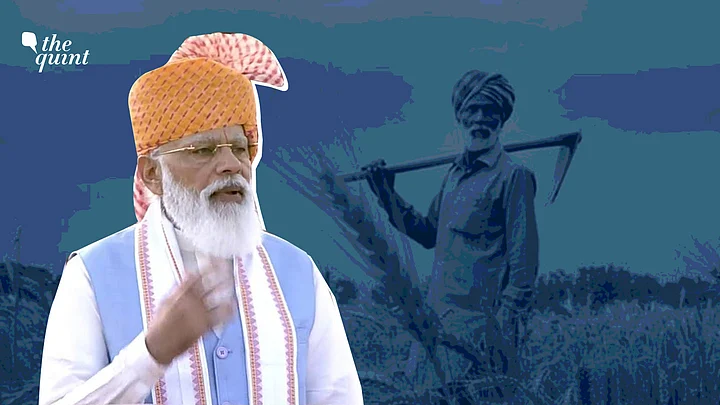Amid sustained resistance from a section of farmers over three controversial agriculture laws introduced by the Bharatiya Janata Party-led central government, Prime Minister Narendra Modi on Sunday, 15 August, said that his government's aim is to turn small farmers into the pride of the nation.
Delivering his Independence Day speech from the ramparts of Red Fort, PM Modi said the country will have to work on strengthening the collective power of farmers.
"Our mantra is 'Chhota kisan bane desh ki shaan'. It's our dream. In years to come, we've to further increase the collective strength of small farmers of the country, we will have to provide them new facilities. 'Kisan rail' runs on more than 70 rail routes of the country today."Narendra Modi, Prime Minister
Adding that farmers have been given new facilities, PM Modi said that they "must become the country's pride."
Need to Work for Next-Gen Infra
Addressing the nation on the occasion of India's 75th Independence Day, PM Modi said that the country will have to work together for "next-generation infrastructure, world-class manufacturing, cutting innovations and new-age technology."
Adding that facilities like road and electricity have reached villages in the past few years, Prime Minister Modi said that "today, optical fibre network is providing the power of data to villages, internet is reaching there."
Maintaining that the digital infrastructure of villages in undergoing rapid change, the prime minister said that "Digital entrepreneurs are getting ready in villages too."
Govt-Farmer Talks Halted
PM Modi's pitch for small farmers comes at a time when the talks between the latter and the government have come to a screeching halt, after farmer groups rejected the Centre's proposal to suspend the controversial farm laws for two years.
The last such discussion between the two parties took place on 22 January, following which some sections of farmers have expressed their willingness to resume the dialogue with the government.
Farmers fear that the new laws could place their interests below those of below corporates and gradually lead to the erosion of the minimum support price for crops.
(At The Quint, we question everything. Play an active role in shaping our journalism by becoming a member today.)
